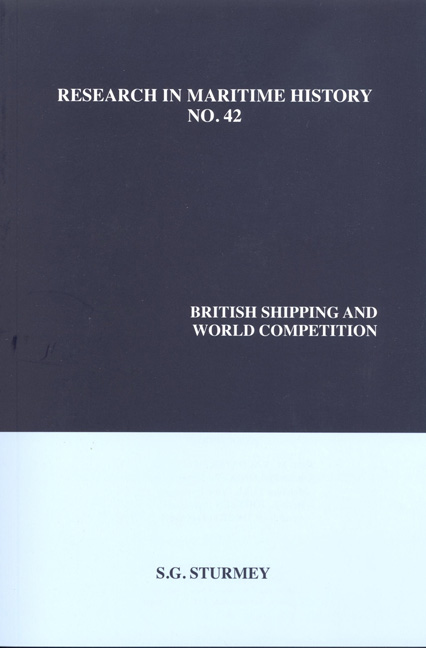Book contents
- Frontmatter
- Table of Contents
- Series Editor's Foreword
- About the Author
- Preface
- Figures and Tables
- Chapter 1 The Problem Defined
- Chapter 2 High Water: The Pre-1914 Period
- Chapter 3 War and Reconstruction
- Chapter 4 The Troubled Years: The Interwar Period
- Chapter 5 Nationalism in Shipping in the Interwar Years
- Chapter 6 The Birth of the Liberty
- Chapter 7 The Prosperous Age: The Postwar Period
- Chapter 8 Enemies of Competition in the Postwar Years
- Chapter 9 Flags of Convenience
- Chapter 10 Economics of Shipping Enterprises
- Chapter 11 Shipowning and Resource Allocation
- Chapter 12 Labour Relations and Labour Costs (by Basil Mogridge)
- Chapter 13 The Conference System
- Chapter 14 The Structure of the British Industry
- Chapter 15 The Question Answered
- Epilogue The Future
- Appendix The Contribution of British Shipping to the Balance of Payments
- Bibliography
- Index
Chapter 9 - Flags of Convenience
- Frontmatter
- Table of Contents
- Series Editor's Foreword
- About the Author
- Preface
- Figures and Tables
- Chapter 1 The Problem Defined
- Chapter 2 High Water: The Pre-1914 Period
- Chapter 3 War and Reconstruction
- Chapter 4 The Troubled Years: The Interwar Period
- Chapter 5 Nationalism in Shipping in the Interwar Years
- Chapter 6 The Birth of the Liberty
- Chapter 7 The Prosperous Age: The Postwar Period
- Chapter 8 Enemies of Competition in the Postwar Years
- Chapter 9 Flags of Convenience
- Chapter 10 Economics of Shipping Enterprises
- Chapter 11 Shipowning and Resource Allocation
- Chapter 12 Labour Relations and Labour Costs (by Basil Mogridge)
- Chapter 13 The Conference System
- Chapter 14 The Structure of the British Industry
- Chapter 15 The Question Answered
- Epilogue The Future
- Appendix The Contribution of British Shipping to the Balance of Payments
- Bibliography
- Index
Summary
The term “Flags of Convenience” describes the flags of such countries as Panama, Liberia [and] Honduras…whose laws allow - and indeed make it easy for - ships owned by foreign nationals or companies to fly these flags. This is in contrast to the practice in the maritime countries (and in many others) where the right to fly the national flag is subject to stringent conditions and involves far-reaching obligations.
The term need not, however, be restricted to the flags of the three countries named, although these are overwhelmingly the most important. The Costa Rican flag was used as a flag of convenience until 31 December 1958, at which date all foreign shipping licences were withdrawn and the foreign-owned ships flying the flag had to find other registration. Before 1914, British sailing ships were often transferred to British-financed companies in Norway to avoid the costs of survey and to take advantage of the cheap, high-quality Norwegian labour. In the interwar period some British companies transferred their shipping operations to Hong Kong in order to take advantage of cheap labour. The Bermudan flag is used as a flag of convenience by a few British owners (see pp. 183-184), while some American and Canadian owners have formed Bermudan shipping companies. Since 1957 the Lebanese flag has been used by some Greek owners. Early in 1960 the flag of Surinam was adopted as a flag of convenience by a subsidiary of a Dutch company. These examples are by no means exhaustive but serve to show that the use of flags other than the national flag of the shipowner is neither a new device nor one solely dependent upon the willingness of the three countries named to accept the registration of foreign- owned ships.
“Flag of Convenience” is a term, certainly now regarded as a term of opprobrium, for the flag of any country which permits persons or companies, other than those with a genuine link with the country, to register their ships in its ports. What constitutes a genuine link, however, is a matter of definition. Some 600,000 tons of British flag shipping, for example, are owned by Greek nationals through companies set up in, and administered from, London.
- Type
- Chapter
- Information
- British Shipping and World Competition , pp. 177 - 196Publisher: Liverpool University PressPrint publication year: 2009

